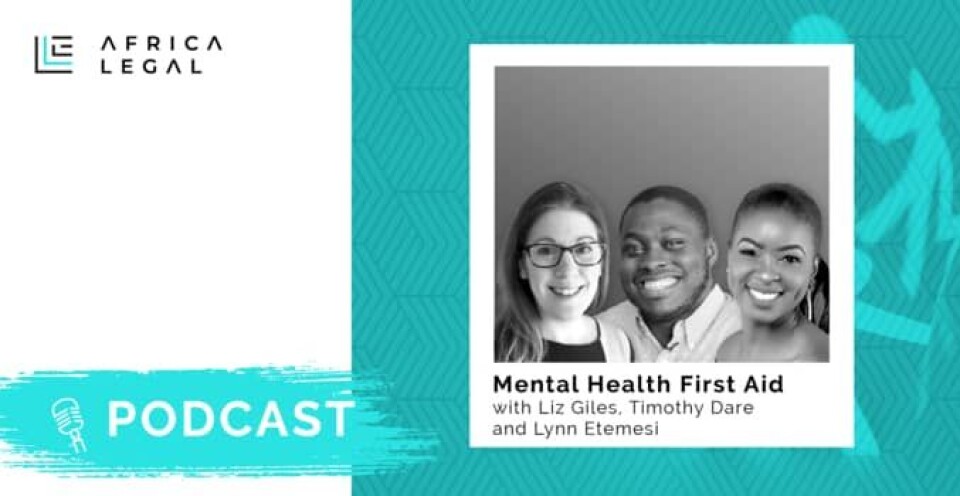Copyright : Re-publication of this article is authorised only in the following circumstances; the writer and Africa Legal are both recognised as the author and the website address www.africa-legal.com and original article link are back linked. Re-publication without both must be preauthorised by contacting editor@africa-legal.com
Mental Health First Aid

Mental health issues require first aid in the same way physical health issues do. In this podcast Africa Legal and guests discuss what’s being done to overcome the stigma attached to mental health issues and why first aiders are required in the workplace and society.
The difficulty in trying to find an outlet to talk about mental health drove Lynnette Etemesi and Timothy Asobele Emmanuel Dare, both lawyers, to create separate platforms for those affected by the illness.
Etemesi, from The Stability Network in Kenya, and Dare, who represents the Anti-Suicide and Depression Squad (ASADS) in Nigeria, said while moves were being made to address mental health wellbeing in their respective countries, there was a lot more work to be done.
This work should include decriminalising attempted suicide, a crime that carries a three year jail sentence in Kenya, said Etemesi. “Suicide is a cry for help. So you can't necessarily charge somebody for attempted suicide and take them to prison instead of helping them out,” she emphasised. “You need to understand (that when someone attempts suicide) it’s not from a criminal perspective, but it is based on whatever it is that is happening around this person and they don't have the mental strength to be able to deal with it.”
Etemesi said while Kenya had crafted a sound mental health policy for the period 2015 to 2030, seven years later, it was still to be implemented.
In Nigeria, Dare said, the Mental Health Law in their Bill of Rights was outdated and had to be reformed to address the problem. “When you read the Nigerian Constitution, you realise that you are sort of against people who have any sort of mental health issues,” he commented, adding that it was important for those in governments across Africa to champion legislation in favour of people with the illness, and for the legal sector to fund legitimate organisations working with sufferers.
Both Etemesi and Dare are strong proponents of mental health first aiders, a career or job title that’s cropping up at firms in the United Kingdom (UK), although it was started in Australia in the year 2000.
Liz Giles has been a mental health first aider at the UK Justice Ministry for the past 18 months. She said the role entailed being receptive and understanding of people who might be in a certain situation that they just don't want to go through. Her appointment came at the time when Covid-19 hit, and the psychological effect of lockdown took its toll.
“It’s just about having somebody outside your team. You know they’re not going to judge you. It can be really informal sometimes; you might not get into any sort of depth of conversation, but it’s just about having someone there and you know it’s a safe space,” Giles explained.
Find out more about this often-taboo topic in the Ubuntu Mental Health Matters series on Spotify, Soundcloud or Apple Podcasts.
To join Africa Legal's mailing list please click here
